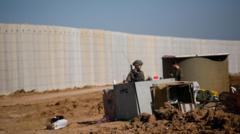In-depth Report:
The deadline for the Israeli withdrawal from southern Lebanon expired early on Sunday, but Israeli troops will remain in key areas, as officials claim the ceasefire agreement with Hezbollah has not been fully honored. This 60-day arrangement, mediated by the US and France, previously sought to halt a 14-month long conflict, calling for both the withdrawal of Israeli forces from the south and the disarmament of Hezbollah militants in the region.
The agreement also mandated the deployment of Lebanese soldiers, who were expected to replace Hezbollah as the primary force in southern Lebanon. This situation poses a significant initial test for Joseph Aoun, Lebanon’s new president, who is determined to instill order and stability in the country. On Saturday, Aoun's office stated that "intensive contacts and consultations" were ongoing to manage the situation in the south, especially regarding what they termed "dangerous Israeli practices."
The conflict had escalated drastically last September, initiating with extensive Israeli airstrikes across Lebanon and the ground invasion of southern territories. The offensive claimed approximately 4,000 lives, many of whom were civilians, displacing over a million people.
Israel's prime minister's office declared that the planned withdrawal hinged on effective contributions from the Lebanese army in southern areas, which also required Hezbollah to retreat further beyond the Litani River. Due to delays in enforcement of the ceasefire agreement, Israel indicated a continuation of its phased withdrawal process in coordination with US authorities, though the extent of their military presence remains undetermined.
The Lebanese army is making efforts to enhance its official positions along the border; however, they cited complications due to Israel’s reluctance to withdraw entirely. Meanwhile, Hezbollah has issued statements warning that any prolonged military presence would be viewed as a blatant violation of Lebanon's sovereignty, signaling potential consequences for the Israeli forces.
Despite Hezbollah's diminished stature following heavy losses, the lack of a definitive response from the group hints at its precarious situation. An anonymous diplomatic source mentioned that Israeli leadership is seeking extra time to dismantle Hezbollah's infrastructure, leading to initial discussions of a 30-day extension.
The fragile truce has allowed an influx of returning residents in Lebanon, yet any provocative actions from Hezbollah could ignite internal discord, as critics assert that the militant group’s actions have been detrimental to national interests.
Seizing the moment, President Aoun is pushing for significant reforms aimed at revitalizing corrupted state institutions, recovering the struggling economy and limiting weapons ownership to state authorities only—efforts that could directly challenge Hezbollah’s military authority.
As these dynamics unfold, the Israeli government's objective remains to facilitate the return of displaced residents, hoping to redefine the security situation along their shared border. Amidst these geopolitical tensions, the region watches closely as both Israeli and Lebanese authorities grapple with the implications of sustained military presence versus the risks of renewed conflict.
The deadline for the Israeli withdrawal from southern Lebanon expired early on Sunday, but Israeli troops will remain in key areas, as officials claim the ceasefire agreement with Hezbollah has not been fully honored. This 60-day arrangement, mediated by the US and France, previously sought to halt a 14-month long conflict, calling for both the withdrawal of Israeli forces from the south and the disarmament of Hezbollah militants in the region.
The agreement also mandated the deployment of Lebanese soldiers, who were expected to replace Hezbollah as the primary force in southern Lebanon. This situation poses a significant initial test for Joseph Aoun, Lebanon’s new president, who is determined to instill order and stability in the country. On Saturday, Aoun's office stated that "intensive contacts and consultations" were ongoing to manage the situation in the south, especially regarding what they termed "dangerous Israeli practices."
The conflict had escalated drastically last September, initiating with extensive Israeli airstrikes across Lebanon and the ground invasion of southern territories. The offensive claimed approximately 4,000 lives, many of whom were civilians, displacing over a million people.
Israel's prime minister's office declared that the planned withdrawal hinged on effective contributions from the Lebanese army in southern areas, which also required Hezbollah to retreat further beyond the Litani River. Due to delays in enforcement of the ceasefire agreement, Israel indicated a continuation of its phased withdrawal process in coordination with US authorities, though the extent of their military presence remains undetermined.
The Lebanese army is making efforts to enhance its official positions along the border; however, they cited complications due to Israel’s reluctance to withdraw entirely. Meanwhile, Hezbollah has issued statements warning that any prolonged military presence would be viewed as a blatant violation of Lebanon's sovereignty, signaling potential consequences for the Israeli forces.
Despite Hezbollah's diminished stature following heavy losses, the lack of a definitive response from the group hints at its precarious situation. An anonymous diplomatic source mentioned that Israeli leadership is seeking extra time to dismantle Hezbollah's infrastructure, leading to initial discussions of a 30-day extension.
The fragile truce has allowed an influx of returning residents in Lebanon, yet any provocative actions from Hezbollah could ignite internal discord, as critics assert that the militant group’s actions have been detrimental to national interests.
Seizing the moment, President Aoun is pushing for significant reforms aimed at revitalizing corrupted state institutions, recovering the struggling economy and limiting weapons ownership to state authorities only—efforts that could directly challenge Hezbollah’s military authority.
As these dynamics unfold, the Israeli government's objective remains to facilitate the return of displaced residents, hoping to redefine the security situation along their shared border. Amidst these geopolitical tensions, the region watches closely as both Israeli and Lebanese authorities grapple with the implications of sustained military presence versus the risks of renewed conflict.
















